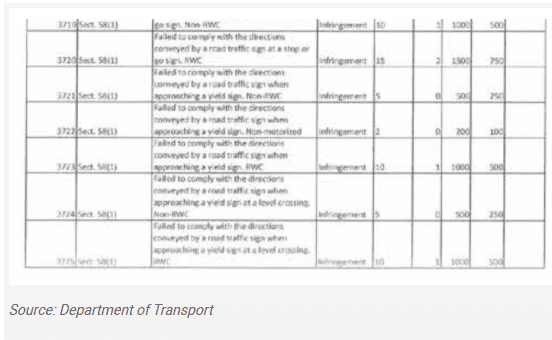Amid calls for regulations to be withdrawn.

With less than a month to go before the controversial Aarto Act comes into effect in 69 municipalities nationwide on 1 December, the City of Cape Town and several surrounding municipalities are asking for exemption.
The Road Traffic Infringement Agency (RTIA), which is responsible for administering the Administrative Adjudication of Road Traffic Offences Act (Aarto), confirmed that the mayors of Cape Town, Swellendam, Stellenbosch, George, Mossel Bay and Bergrivier (Piketberg) have requested exemption from the next phases of Aarto implementation.
This refers to the planned expansion of Aarto from the current two metros – Johannesburg and Tshwane – to 69 more municipalities on 1 December, and then to the remaining municipalities on 1 April.
JP Smith, Cape Town Mayoral Committee Member for Safety and Security, told Moneyweb the city considers Aarto impractical and unworkable because it depends on a functioning South African Post Office to serve critical documents to alleged offenders via registered mail, as well as on the eNatis traffic information system. According to Smith, that system is often offline, and much of its data is incorrect.
ALSO READ: City of Cape Town to sidestep Aarto
Monde Mkalipi, RTIA spokesperson, said the agency is still studying the documents submitted by the municipalities and will comment once the process is complete.
Although Aarto has been on the statute books since 1998, it was implemented in Tshwane only in 2008 and Johannesburg two years later. Plans to roll it out nationally have repeatedly been postponed at the last minute.
The system will fundamentally change traffic law enforcement, and the current plan is to activate the demerit points system – part of Aarto – on 1 September next year. Under this system, repeat offenders risk suspension of their driver’s licences if they exceed 15 demerit points, or even cancellation, unless they change their ways.
Meanwhile, Rob Handfield-Jones, managing director of driving.co.za and a specialist in driver training, has written to parliament’s Portfolio Committee on Transport asking that it press Minister of Transport Barbara Creecy to withdraw and republish the Aarto regulations issued a week ago, because parts of the published document are illegible.

Handfield-Jones also requested that the public be given another opportunity to comment on the regulations, since significant changes have been made compared to the draft version released in 2020.
ALSO READ: ‘Aarto means cold drinks’: Act to unleash chaos on SA roads, warn experts
The committee’s secretary, Valerie Carelse, confirmed receipt of Handfield-Jones’s letter and said the matter is currently before the chair, ANC MP Selelo Selamolela.
Among Handfield-Jones’s concerns is that the authorities are empowered to reissue contravention notices if they botched the Aarto process – with no limit on how many times this can be done.
“You can’t do that with a summons,” he said. “It gives the RTIA a free pass to be incompetent, because they can just repeat the process until they get it right.”
The regulations also allow a vehicle’s registered owner to nominate the person who was actually driving at the time of the alleged offence. However, the requirement that the owner must provide an ‘acceptable’ identification of that person worries him.
“If I get a fine because faulty eNatis data lists me as the owner, how am I supposed to find the real owner? What if he’s dead, abroad, or simply refuses to cooperate?” Handfield-Jones asked.
He also criticised the creation of a nine-member tribunal, operating on a part-time basis, to hear appeals from motorists across the country whose representations against fines were rejected by the RTIA. He called this an unnecessary layer of bureaucracy, saying such cases should rather be heard by the relevant magistrate’s court.
Handfield-Jones pointed out that motorists will have to pay R60 per query to find out how many demerit points they have. He said this costs the RTIA virtually nothing to provide and should be free of charge.
“Imagine Sars charging a fee to give you your account statement – it’s exactly the same,” he said. “If a driver earning the minimum wage of R4 100 has to provide proof of his demerit status every quarter, as employers may require them to do, he’ll spend 5% of his annual income on it. That’s someone who can barely afford a plate of food a day!”
ALSO READ: Aarto demerit system: Beware of ‘ghost fines’ from fraudsters
Cornelia van Niekerk, owner of Fines4U, which manages large volumes of traffic fines for individuals and companies, said Aarto doesn’t even function properly in the two metros where it is in effect – so how will it work nationwide?
Van Niekerk says she sees daily that the process is applied arbitrarily.
Some infringement notices remain untouched, while others are escalated with severe consequences for those involved – such as being blocked on the eNatis system, preventing them from renewing licences or registering or deregistering vehicles.
The RTIA’s processes are slow, and deadlines are routinely ignored, she said.
“And if Cape Town is granted an exemption, will that open the door for other municipalities to ask for the same?” she asked.
This article was republished from Moneyweb. Read the original here.






